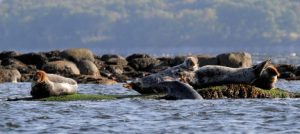
Leveraging Data to Understand Gray Seal Health
By Iris May-Fleming, Media Intern
As part of the University of Maine’s (UMaine) Initiative for One Health and the Environment, third-year Ph.D. candidate Christina McCosker works to delve into the complexities of marine mammal health. The initiative furthers research that advances the intersection between climate change and emerging issues in animal, plant, and human health. Working under UMaine Associate Professor of Marine Sciences Kristina Cammen, McCosker uses an interdisciplinary perspective to investigate drivers of disease outbreaks in seals.

The Northwest Atlantic is home to two species of pinnipeds year round— gray and harbor seals. While both species are susceptible to viral diseases, gray seals are more resistant than harbor seals. McCosker’s research aims to understand why this is the case, and to investigate the drivers of disease outbreaks in these animals. “The work varies a lot from day to day.” McCosker explained. “We’re in the manuscript writing stage right now, so I’m writing for large chunks of my day. For another project I’m working to determine how environmental contaminants affect disease prevalence in seals, doing a lot of coding in R.” For her research on the infectious disease in seal populations, she adds, “I’ve spent countless hours in the lab extracting DNA from seal skin.”
Computational resources have played a crucial role in this research, and McCosker appreciates the technical support provided by one of ARCSIM’s strategic partners, the Ohio Supercomputing Center (OSC). “OSC has been fantastic.” McCosker explained. “One of the main attractions for OSC is it already has the main software programs for sequencing data up and running, so I don’t need anything to be added to perform my work. My research has a lot of very large sequencing files, and the work wouldn’t be possible without accessible robust computing infrastructure.”

Collaboration with ARCSIM has also been an essential part of her research process, McCosker explained. “Laura Jackson has helped a lot, she has been phenomenal. There were a lot of times when she hopped on last minute zoom calls to help me walk through code.” McCosker’s research also makes the most of ARCSIM’s access to backup allocation, which lets her limit storage usage for research data on OSC.
The ultimate goal of this research is to contribute to the general understanding of environmental and marine mammal health issues, expanding on her previous research that explored how the presence of parasites in the body could affect the diet of Gray Seals. “For the most part there’s a lot that we still don’t know. I’m hoping to fill in some of those gaps.” McCosker explained. She hopes her work will support marine mammal stranding networks like Marine Mammals of Maine that care for sick, injured, and abandoned mammal populations, enabling them to better respond to distressed seals and other marine mammals.
McCosker’s study holds significant implications for comprehending the effects of human activities on animal well-being, as well as enhancing the protection of both human and animal health in coastal ecosystems, as there is the potential for diseases to jump from animals to humans if the right virus adapts in the right way. The deployment of advanced computational resources for data sequencing proves essential in unraveling these intricate systems, providing valuable insights into the diverse mammals inhabiting Maine’s coastal waters.
